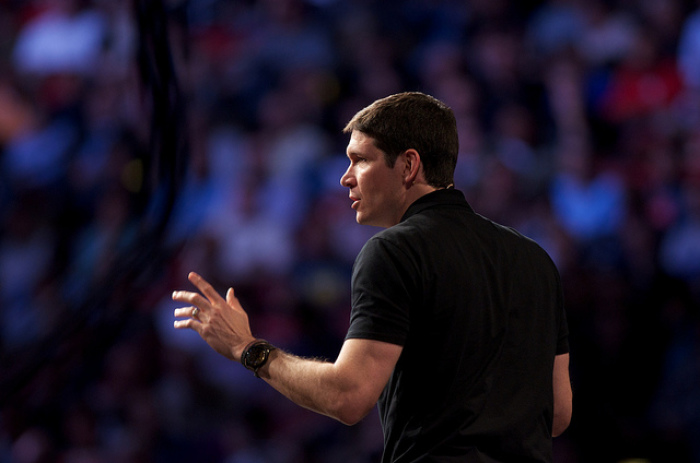Pastor Matt Chandler Speaks Up About 'White Privilege,' 'Nonsense' Going on in Ferguson

Matt Chandler, pastor of The Village Church in Texas and president of the church planting network Acts 29, took to his blog Tuesday to expound upon his tweets about white privilege, why white people should join in the fight for justice, and how it related to the developments in Ferguson, Missouri.
Chandler spoke about the events on Sunday at the church in Flower Mound, Texas.
"When I look at Ferguson and think of the nonsense that's going on in Ferguson, even how it's being handled on all different sides…my heart just grieves." Chandler said. " As a white man who does not struggle with white guilt, here's what I know. My 8 year old son is blonde and has blue eyes…my son never in his life will be followed around a store and wonder what he's doing."
After largely mixed responses to his tweet, Chandler posted on the church's blog to continue to talk about how he felt.
"This morning I tweeted out two sentences that were in the sermon I preached this past weekend at The Village." Chandler said. "Both sentences were meant to address and serve as an illustration of 'white privilege,' the idea that white people, in most cases, have easier paths than most black people."
Chandler explained that white privilege is not like blatant racism, and folks who live through it may never have a racist bone in their body.
"What is so deceptive about white privilege is that it is different from blatant racism or bias." Chandler said. A privileged person's heart may be free from racist thoughts or biased attitudes, but may still fail to see how the very privilege afforded to him or her shapes how he or she interprets and understands the situations and circumstances of people without privilege."
Chandler pointed out that the biggest issue with white privilege is that most white Americans do not even realize that the privilege is there. He warned that generalizing one's experiences and thinking that they are congruent with another's is not the right thing to do.
"The challenge with white privilege is that most white people cannot see it," Chandler explained. "We assume that the experiences and opportunities afforded to us are the same afforded to others. Sadly, this simply isn't true."
Chandler addressed the angst and apprehension that most White people deal with when it comes to confronting white privilege and racism, whether it be acknowledging it or simply dismissing it as just an issue for minorities.
"It has been my experience that there are few things that enrage a large portion of white people like addressing racism and privilege," Chandler revealed. "We want to move past it, but we are not past it. Clearly, we are not past it. So, let's press in to it."
Racial tension flared up across the nation after unarmed teenager Michael Brown was fatally shot by Ferguson Police Officer Darren Wilson on Aug. 9. Wilson administered two shots to the head of Brown and landed shots on his other extremities. Brown allegedly had his hands up as Wilson stood over him and fired the fatal shots.
After the shooting, authorities left Brown's body in the middle of the street for hours, only covering it before it was hauled away in an SUV. Officer Wilson was suspended with pay, but not arrested. In the days since, Ferguson has become a place of constant protest, civil unrest, and devoid of answers. On Monday evening two people were shot (not by police), and 75 people were arrested for not dispersing.
When pastor Chandler was asked on Twitter what white privilege had to do with Brown's murder, he correlated the feelings of the community of Ferguson to the fact that the treatment just isn't the same for those of a different community.
"The facts are still being debated, and I am hopeful that justice will take place once those can be established, but the way white people tend to perceive the situation in Ferguson, Missouri and in situations like this is through distinctively white lenses," Chandler argued. "We believe that our experiences, histories and benefits of our hard work are universal experiences for everyone. This is simply not true. I'm not a sociologist, but I've read enough, lived in enough places and have enough friends that I'm beginning to understand what motivates the frustrations and anger that can exist deep in the hearts of young black men."





























